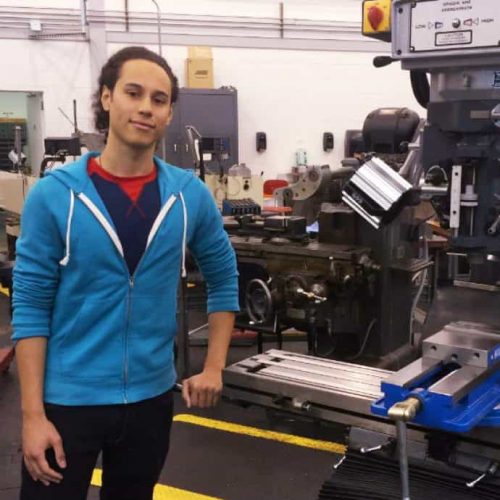This story is published in partnership with Investigative Reporting Workshop.
Introduction
Ida Habtemichael understands she’s a statistical rarity.
Black, female mechanical engineers make up less than 2 percent of the engineering workforce. A role model for those seeking STEM careers, she couldn’t be prouder of her 14 successful years rising through the senior ranks of Micron Technology. Yet Habtemichael admits she downplays the exact title of her college degree.
“I don’t really identify that I have a bachelor’s degree in mechanical engineering technology, because there’s a stigma,” she said. “So, I don’t specify the technology portion of my major. It’s almost like a secret.”

She is an equipment engineer, developing robotic monitoring systems. She founded a Black Employee Network 12 years ago that she is still involved in and heads a women’s leadership group.
But all that experience and a deep understanding of how to keep mechanical processes efficient are insignificant when it comes to getting a license to work in one-third of the country.
In nine states, engineering technology graduates like Habtemichael are prohibited by law from becoming a licensed professional engineer. In the colloquially named “Hell no!” states of Illinois, Kansas, Kentucky, Michigan, Missouri, South Carolina, Tennessee, Utah and Wyoming, Habtemichael’s 4-year engineering technology degree from the Rochester Institute of Technology means nothing.
An IRW investigation found an additional nine states in which legislators have created licensing exam barriers so onerous that engineering technology degree graduates are locked out of licensure in nearly every scenario.
In Alabama and Nebraska, for example, Habtemichael would have to go back to school and earn a master’s or doctorate in engineering before that state’s certifying board might allow her to become licensed. Arkansas, Idaho, Iowa, Louisiana, Minnesota, Mississippi and Rhode Island have similar rules requiring additional graduate-level degrees or credits, which create roadblocks for working engineers with technology-stamped degrees to apply for licensure.
Although closely related, engineering technology and engineering/engineering science are two separate degree paths. Engineering programs focus on conceptual skills and design, while engineering technology programs emphasize practical application.
“I just think it’s absurd,” she said. “If you’re able to do the job correctly, pass the exams and other states accept you, then it makes sense for other states to follow suit.”
This inequity slams the door on many engineers, especially Black engineers, who are twice as likely to enroll in engineering technology programs as they are in engineering programs that guarantee a path to licensure. ET programs tend to be more financially accessible and have lower starting math requirements, making them more suitable for academically disadvantaged students.

Robert Weissbach, chair of the Engineering Technology department at Indiana University–Purdue University Indianapolis, agreed.
“They’re being held back simply because the degree is a more applied-engineering degree,” he said. “I think that’s inappropriate.”
Weissbach was among a group of university deans who contacted the Investigative Reporting Workshop last fall, saying the reason certain states restrict ET students’ access to licensure may partially be because those students are disproportionately Black.
“Institutional racism is embedded in … the educational system that inadequately prepares Black students for science and engineering pursuits,” Ron Dempsey, dean of Oakland City University, wrote after researching the subject for his dissertation in 2018 from Georgia Tech. “[It] infects the historical structures of engineering accrediting bodies and results in the creation of parallel but unequal pathways into the field of engineering.”
IRW spent months asking lawmakers, engineers and government agencies to explain why there’s no national standard for the licensure of engineers with four-year engineering technology degrees. The collective answers ranged from institutional racism to protecting the status quo to concerns over educational qualifications.
Engineers who want to become licensed in a state must obtain an accredited engineering degree, pass the Fundamentals of Engineering exam, demonstrate work experience and pass the Principles & Practice of Engineering, or PE, exam.
An IRW breakdown of licensure application rules and laws nationwide show engineering technology degrees are recognized as equivalent to engineering degrees in only 12 states.
There’s no evidence to suggest that students from engineering technology programs are less prepared for the exams or underperform once licensed, Weissbach said.
You get paid less
Licensing is much more than just a matter of prestige; it comes with many opportunities. Only licensed engineers may submit engineering plans to public authorities, work as private practitioners and consulting engineers or apply for certain federal, state and municipal government contracts.
“You get paid less [when you’re unlicensed],” said Carol Lamb, chair of the Engineering Technology Council, a group of academics that oversees the quality of technology programs. “You can’t manage or lead certain projects because you can’t be the lead engineer without a PE license.”
A survey by the American Society of Mechanical Engineers found that licensed mechanical engineers’ annual median income was about $16,000 higher than that of mechanical engineers without a PE license.
Keith Johnson, who chairs the engineering department at East Tennessee State University, said the salary gap starts to form as some engineers fulfill their four years of work experience to sit for the PE and be licensed. The licensed engineers will have access to more lucrative managerial positions and contracts not open to unlicensed engineers.
Chayanne Robles said he first experienced the pay gap during an internship he did while studying mechanical engineering technology at the Rochester Institute of Technology. Robles, who identifies as multiracial, said he got the same internship as his friend, a white mechanical engineering student.
“You get paid less [when you’re unlicensed]. You can’t manage or lead certain projects because you can’t be the lead engineer without a PE license.”
Carol Lamb, chair of the Engineering Technology Council
“Based on what I knew from his educational experience and everything that I’ve been through, I felt like we were on a level playing field, but because he had a different degree, he made more money,” Robles said.
Now 27, Robles is a process improvement engineer at the same company, whose name he asked to be omitted. He was hired straight out of school through one of the leadership programs the company has for recent graduates. He qualified for the operations leadership program he wanted, but said he wouldn’t have been able to pursue the engineering leadership program that only accepts engineering students.
He said his position doesn’t require a license, but he’s confident he will pursue licensure because it opens more doors and offers more job security.
“As an employee, it makes you less disposable,” he said.
Not much choice
Habtemichael was raised by Eritrean immigrant parents in a low-income neighborhood near RIT in New York. Inspired by her father, who worked as a machinist for 30 years, she applied to RIT’s engineering program.
She said the application was a general one and that she didn’t specify engineering or engineering technology because she was not aware of the distinction. When RIT offered her a place as an ET student, she said she was just happy to be accepted.
“To be honest, I don’t feel I had much choice in the beginning, and I didn’t know any different,” she said. “It wasn’t until after that I realized there may be some impact in terms of getting hired.”
East Tennessee State University, which offers programs in both engineering and engineering technology, is about 15 miles from the Virginia border. Johnson, the department chair, said crossing state lines is the only option for his ET students who want to be licensed, many of whom weren’t aware that this would be their post-graduation reality.
“I have a student who went to Virginia to work and eventually get his professional license,” Johnson said. “He didn’t know about [the state restrictions] when he started out and was very disappointed later to realize that the state of Tennessee would not allow him to sit for the PE.”
Johnson said that, like his student, he himself didn’t fully understand the differences in opportunity for the two disciplines when he switched from engineering to engineering technology in his first year at North Carolina A&T State in 1983.
Johnson had never heard of engineering technology before arriving at college until he was paired with a roommate who was an ET major. While Johnson was taking theoretical classes, his roommate was in the lab.
“Though I did well in theoretical courses, I just had a passion for hands-on work since I grew up on a farm,” Johnson said.
Johnson knew early on that he wanted to teach, so the PE exam was never in his plans. However, he said he does find it interesting that he can head an engineering department and teach engineering in Tennessee but can’t sit for the license.
“You have people who are training others to be their supervisors,” he said.
He also evaluates engineering programs around the country for the Accreditation Board for Engineering and Technology and said he’s found that many engineering departments now incorporate more laboratory experience.
“I’m sure many wouldn’t appreciate this statement, but it looks to me like they are starting to model after engineering technology,” Johnson said.
Parallel but unequal pathways
American Society for Engineering Education data shows that racial minorities continue to be underrepresented in engineering education. In 2018, just 4.6% of engineering degrees were earned by Black students compared with 11.4% by Hispanic students and 61.5% by white students.
Although still underrepresented, Black students occupy a larger space in engineering technology education. In 2018, 8% of engineering technology degrees were earned by Black students, 9.4% by Hispanic students and 70.7% by white students.
When Robles started at Onondaga Community College in Syracuse, New York, in 2011, his plan was to graduate as quickly as possible and get a job. He chose to study mechanical engineering technology not only because he was interested in practical experience, but also because the engineering program had a higher math requirement that would have meant taking additional courses to catch up.
Racial gaps in the quality of K-12 education are also a factor, said Oakland City College’s Dempsey. Engineering programs require students to take calculus in their first year, and students from disadvantaged backgrounds are not adequately prepared, he said.
“If you struggle with math, engineering technology is going to be better,” Dempsey said. “Not only because it may not require a high level [of math skills], but because it also embeds math in the application in the course.”
“Prior to integration, the universities in the South and elsewhere did not allow for African Americans to attend and get engineering degrees.”
Robert Weissbach, chair of the Engineering Technology department at Indiana University–Purdue University Indianapolis
Robles went on to graduate from RIT in 2016, becoming the first person in his family to earn a bachelor’s degree.
Another major reason Black students are twice as likely to study engineering technology is because historically Black colleges and universities generally lack accredited engineering departments.
“Prior to integration, the universities in the South and elsewhere did not allow for African Americans to attend and get engineering degrees,” Weissbach of Indiana University-Purdue University said. “So basically HBCUs had engineering technology programs that were still providing preparation for an engineering career, but those students were not allowed to sit for licensure.”
During the 1960s, Howard University was the only Historically Black College and University with an accredited engineering department. A decade later, the Accreditation Board for Engineering and Technology accredited six more HBCU programs, and Black engineers were finally allowed to gain professional licensing.
Over the past 60 years, the number of accredited engineering programs has increased to 16 of the 107 HBCUs in the U.S.
National association breaks its silence
The National Society of Professional Engineers has long been regarded as part of the problem by those advocating for diversity in the field. In a 1996 article, ET educators wrote that NSPE is the most influential professional society and that it uses that power to maintain the status quo.
“Historically, the NSPE has been no great friend of engineering technology,” the authors wrote.
And Weissbach said that NSPE “unfortunately … hasn’t taken steps to actually address educational diversity. It wants everything to be done one way, and any variation from that one way is, if not rejected, at least frowned upon.”
NSPE’s leadership addressed the issue for the first time in a recent interview with IRW.
“NSPE supports a path to licensure [for all engineering technology students], but it may be a different path than somebody who gets an engineering degree because the two degrees are different,” said organization President Tricia Hatley.
The national association doesn’t dispute that regulations are a disproportionate barrier for Black engineers, Hatley said, adding that the organization is still in “learning mode” to understand the scope of the issue.
Jacquelyn Brooks, chair of NSPE’s Diversity, Equity and Inclusion Advisory Committee, said the organization is working to collect racial demographic data on licensed engineers in the U.S.
Brooks, who is Black, said she felt for a long time that NSPE’s commitment to diversity was just PR, but that the creation of her committee and other recent changes make her feel that the organization is “on the right track.”
Nevada looks to the future, South Carolina returns to the past
The Nevada Board of Professional Engineers and Land Surveyors recently voted unanimously to treat engineer degree-holders equally during the licensing process. Engineering techs are no longer required to have additional experience before taking the PE exam.
Executive Director Patty Mamola said the board took action after discussing how the additional requirements were affecting engineers of color as well as other groups.
“Generally, the type of students attracted to ET degrees come from disadvantaged communities. Race, rural areas versus cities, and money are factors for those likely to pursue ET degrees,” Mamola told IRW. “I put it on the agenda and am happy with the outcome of what the board chose to do.”
Mamola is no stranger to the politics of licensing engineers. She was the first woman to lead NCEES, the National Council of Examiners for Engineering and Surveying.
“The fight against changing (treatment of ET degree-holders) is always ‘public safety.’ That is the shield they hide behind. It’s gate-keeping instead of gate-tending mentality,” Mamola said. “One of my goals at NCEES was to have portable licenses. For 100 years, engineers have been talking about that and still don’t have it. We can keep talking about mobility, but we also need to make changes to actually have mobility.”
Mamola emphasized that it’s not the accredited degree that earns engineers the right to work; it’s their ability to pass the PE exam, calling it “the great equalizer.”
In South Carolina, politicians moved in the opposite direction, reversing a law that had allowed some engineering technology degree holders to sit for professional exams.
The change to SC Code 40-22-222 went into effect June 30, 2020.
Although the new law doesn’t apply to engineers who were licensed before that date, the change concerned stakeholder groups, said John Lane, a director at the South Carolina Commission on Higher Education.

He said the main concerns are that Black students will be held back from opportunities and move to other states to get licensed, leading to a “brain drain” of potential engineers.
“This is not meant to close doors of opportunity,” Lane said. “It’s not meant for minorities to be casualties of policy change.”
State Sen. Mia McLeod sponsored a bill in 2019 that would have formed a committee to reconsider the restrictions on engineering technology students and extend licensing opportunities to them until 2025. The measure failed and the senator’s office said she had no plans to pursue the issue further.
“There’s still interest in very important places,” Lane said. “The intent of a state system is to provide an effective and efficient ecosystem for the state’s students, and we’re always looking for leak points.”
Adding to the bias
Habtemichael, who also works as a recruiter, said the bias against engineering technology often makes it difficult for recruiters to convince hiring managers to give ET degree-holders a chance.
She said this disproportionately affects minority candidates who are often already disadvantaged, especially earlier in their careers.
“Black & Latino students already have a bias against them coming out of the university,” Habtemichael said. “Having an identifiably nonwhite name on your resume already adds to the bias. Add an engineering technology degree, and it detracts from their chance even more.”
Zeina Mohammed is a graduate fellow at the Investigative Reporting Workshop.
Correction: May 17, 10:30 a.m.: Tricia Hatley is the president of the National Society of Professional Engineers. A previous version of this story misspelled her last name.





Join the conversation
Show Comments